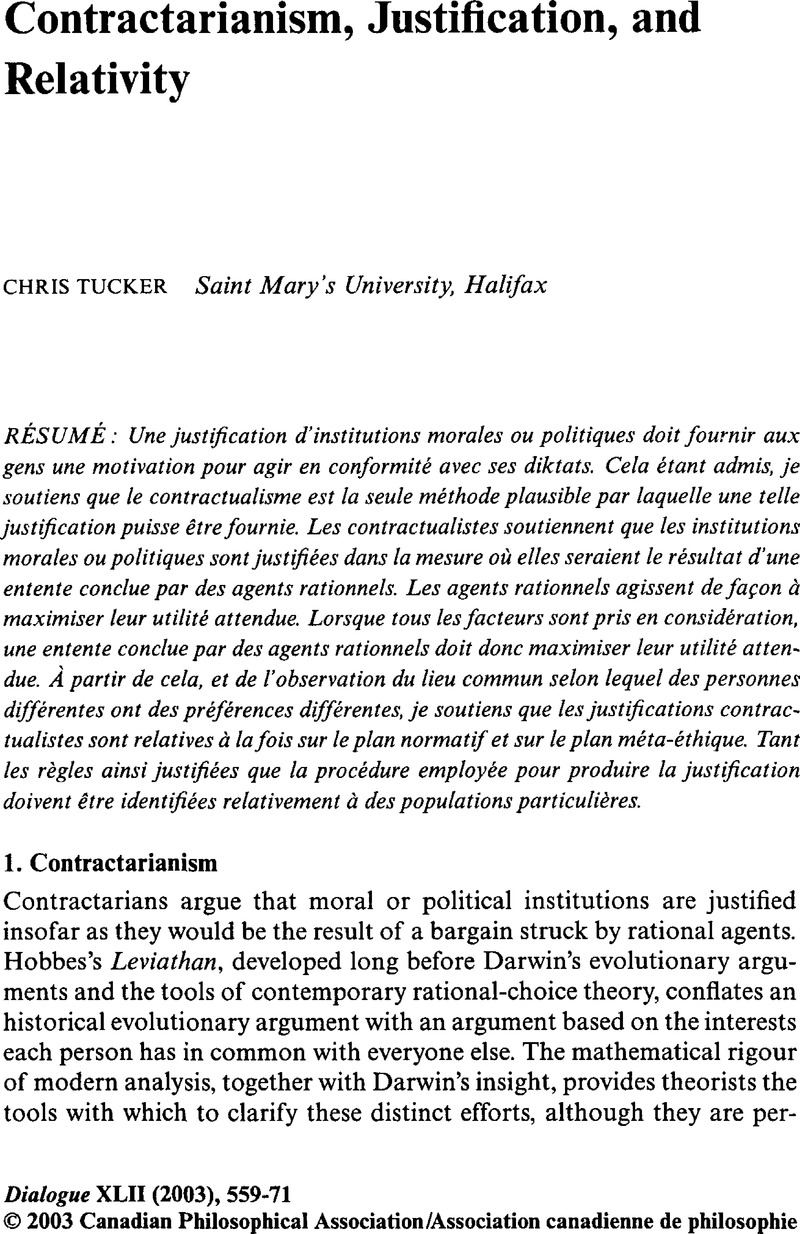No CrossRef data available.
Published online by Cambridge University Press: 13 April 2010

1 See Tucker, Chris, “Games Without Rules: The Contemporary Obfuscation of Rational Choice and Game-Theoretic Analyses,” in Closing the Is/Ought Gap, edited by Viminitz, Paul (London, UK: Interest Group in Formal and Applied Logic, forthcoming).Google Scholar
2 Axelrod, Robert, The Evolution of Cooperation (New York: Basic Books, 1984)Google Scholar; Danielson, Peter, Artificial Morality (New York: Routledge Press, 1992)Google Scholar; and Skyrms, BrianEvolution of the Social Contract, (New York: Cambridge University Press, 1996).CrossRefGoogle Scholar
3 It also depends on the types of games one plays with such agents, but this is not central to the argument.
4 It has been suggested by an anonymous referee that Gauthier explicitly relativizes his contractarianism by positing that his account will only result within the circumstances of justice. This conflates a claim of universality (roughly understood as claiming that the morality holds in every possible world) with a claim of non-relativity (roughly understood as a claim that this morality holds in each world where morality is possible).
5 Providing an in-principle argument for the deficiency of all other attempted justifications being beyond my reach, I will here suggest only that all leading competitors in this enterprise fail for reasons intrinsic to each.
6 Rawls, John, A Theory of Justice (Cambridge, MA: Harvard University Press, 1971), p. 18.Google Scholar
7 Rawls, John, Political Liberalism (New York: Columbia University Press, 1996)Google Scholar, and Habermas, Jiirgen, Moral Consciousness and Communicative Action, translated by Lenhardt, Christian and Nicholsen, Shierry Weber, (Cambridge, MA: MIT Press, 1993).Google Scholar
8 These terms are familiar from David Wong's efforts, but differently applied in this work. In his article “Moral Relativism” for the Routledge Encyclopedia of Philosophy (Craig, Edward, general ed. [New York: Routledge Press, 1998], Vol. 6., pp. 539–42)Google Scholar, Wong defines normative relativity as the claim that it is wrong to pass judgement on other moral systems that differ from one's own. Meta-ethical relativity is the modest thesis that there is no one true or most-justified morality. These are not the definitions with which I wish to proceed, but no other terms capture my proposed categorization as perspicuously.
9 Gauthier, David, Morals by Agreement (New York: Oxford University Press, 1986), p. 86.Google Scholar
10 Ibid.
11 This analysis does not include a discussion of rent, as explicitly recognized by Gauthier in Morals by Agreement, p. 98.
12 Ibid., p. 94.
13 Arguing that the endowments are fair is seen to be a necessary step for ensuring that bargains reached therefrom are fair, which in turn is necessary for Gauthier to plausibly claim that his results identify and justify morality.
14 David Gauthier, Morals by Agreement, p. 205.
15 Predatory is here used in a non-pejorative sense. It is used to characterize interactions where one agent makes use of the factor endowments of another agent while excluding the second agent from the derived surplus.
16 For examples, see Hampton, Jean, “Two Faces of Contractarian Thought,” in Contractarianism and Rational Choice, edited by Vallentyne, Peter, (New York: Cambridge University Press, 1991), pp. 31–55Google Scholar; Narveson, Jan, “Gauthier on Distributive Justice and the Natural Baseline,” in Contractarianism and Rational Choice, edited by Vallentyne, Peter, (New York: Cambridge University Press, 1991), pp. 127–48Google Scholar; and Tucker, Chris, “A Moral Obligation to Obey the State,” Journal of Value Inquiry, 34, 2–3 (2000): 333–47.CrossRefGoogle Scholar
17 Where the maximal claim is all of the cooperative surplus to which an agent contributes, and the minimal claim is none of the cooperative surplus to which an agent contributes.
18 See Nash, J. F., “The Bargaining Problem,” Econometrica, 18 (1951): 155–62CrossRefGoogle Scholar, and Nash, J. F., “Two-Person Cooperative Games,” Econometrica, 21 (1953): 128–40.CrossRefGoogle Scholar